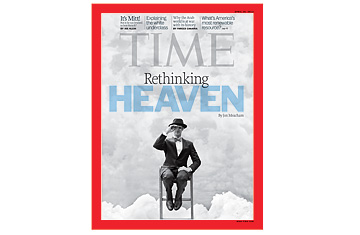
(5 of 6)
Unsurprisingly, our polarized age is now producing polarized visions of heaven. Many Christians often focus more on accepting Jesus as their personal savior and the subsequent enforcement of biblical laws in preparation for the world to come--what they think of as the blue-sky heaven. "Many people think that eternal destiny is determined by behavior," Charles Stanley, senior pastor of First Baptist Church of Atlanta, writes on his website InTouch.org "Our entrance into heaven has nothing to do with how good we are; what matters is how good Jesus is, and what He did for us." To accept Jesus' atoning sacrifice, Stanley says, is to be given "a ticket to heaven which can never be revoked."
But led by Wright, scholars and historians like Union Theological Seminary's Christopher Morse argue that the Bible, rightly read, foreshadows a different human destiny than the one anticipated by so many pastors, artists, poets, hymn writers and ordinary believers. This point of view is one in which the alleviation of the evident pain and injustice of the world is the ongoing work that Jesus began and the means of bringing into being what the New Testament authors meant when they spoke of heaven. The earth is not a temporary place that will disappear on the last day, and heaven means "God's space." And so with all respect to the views of believers like Stanley, the Wright school holds that one should neither need nor want a ticket out of the created order into an ethereal realm. One should instead be hard at work making the world godly and just.
Both camps in the heaven debate share the Christian conviction that Jesus is Lord. Both sides believe in good works. (Colton's dad, Pastor Burpo, whose ministry sponsors programs for homeless kids, among others, says, "People who are heaven-minded are world changers ... you are just passing through, but you are here to make a difference.") The issue is one of emphasis. And the balance is in flux. Among younger believers in particular, the 21st century has seen a tangible move within evangelical Christianity to focus less on the enforcement of conservative convictions about sexual ethics and more on following Jesus' commandment in Matthew 25 to feed the hungry, welcome the stranger and clothe the naked as though they had found Jesus himself hungry, homeless or bereft.
It's worth noting that the theological view of heaven as a spur to social justice is more prevalent in richer parts of the world than in poorer regions. In Europe and in the U.S., upward mobility and wider prosperity give believers the leisure to think in broader terms about religion. However, as Cleophus LaRue, a National Baptist preacher who teaches homiletics at Princeton Theological Seminary, points out, the global South still believes in the miraculous. The poor often cling to the hope of a future heaven to persevere through life's hardships.
